Related Research Articles

Fiji, officially the Republic of Fiji, is an island country in Melanesia, part of Oceania in the South Pacific Ocean. It lies about 1,100 nautical miles north-northeast of New Zealand. Fiji consists of an archipelago of more than 330 islands—of which about 110 are permanently inhabited—and more than 500 islets, amounting to a total land area of about 18,300 square kilometres (7,100 sq mi). The most outlying island group is Ono-i-Lau. About 87% of the total population of 924,610 live on the two major islands, Viti Levu and Vanua Levu. About three-quarters of Fijians live on Viti Levu's coasts: either in the capital city of Suva; or in smaller urban centres such as Nadi—where tourism is the major local industry; or in Lautoka, where the sugar-cane industry is dominant. The interior of Viti Levu is sparsely inhabited because of its terrain.

The Pacific Community (PC), formerly the South Pacific Commission (SPC), is an international development organisation governed by 27 members, including 22 Pacific island countries and territories. The organisation's headquarters are in Nouméa, New Caledonia, and it has regional offices in Suva, Pohnpei, and Port Vila, as well as field staff in other locations in the Pacific. Its working languages are English and French. It primarily provides technical and scientific advice, and acts as a conduit for funding of development projects from donor nations. Unlike the slightly smaller Pacific Islands Forum, the SPC is not a trade bloc, and does not deal with military or security issues.

The Fijian coups d'état of 1987 resulted in the overthrow of the elected government of Fijian Prime Minister Timoci Bavadra, the deposition of Elizabeth II as Queen of Fiji, and in the declaration of a republic. The first coup d'état, in which Bavadra was deposed, took place on 14 May 1987; a second coup d'état on 25 September ended the monarchy, and was shortly followed by the proclamation of a republic on 10 October. Both military actions were led by Lieutenant Colonel Sitiveni Rabuka, then third in command of the Royal Fiji Military Forces.
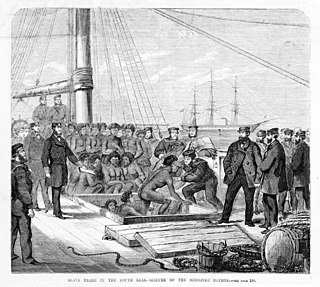
Blackbirding involves the coercion of people through deception or kidnapping to work as slaves or poorly paid labourers in countries distant from their native land. The term has been most commonly applied to the large-scale taking of people indigenous to the numerous islands in the Pacific Ocean during the 19th and 20th centuries. These blackbirded people were called Kanakas or South Sea Islanders. They were taken from places such as Papua New Guinea, the Solomon Islands, Vanuatu, Niue, Easter Island, the Gilbert Islands, Tuvalu, the Fiji islands and the islands of the Bismarck Archipelago amongst others.
The University of the South Pacific (USP) is a public research university with locations spread throughout a dozen countries in Oceania. Established in 1968, the university is organised as an intergovernmental organisation and is owned by the governments of 12 Pacific island countries: the Cook Islands, Fiji, Kiribati, Marshall Islands, Nauru, Niue, Samoa, Solomon Islands, Tokelau, Tonga, Tuvalu and Vanuatu.
Hari Punja, OF, OBE is an Indo-Fijian businessman and Chairman of Hari Punja Group of Companies. Hari Punja and Sons Limited is a very diversified company in Fiji.
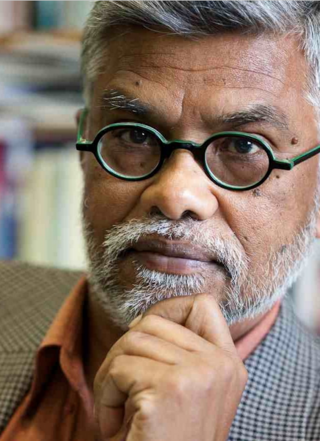
Brij Vilash Lal, OF was an Indo-Fijian historian who wrote about the Pacific region and the Indian indenture system. A harsh critic of the Bainimarama government, which originated in the military coup of 2006 and retained power in the 2014 elections, he lived in exile in Australia.
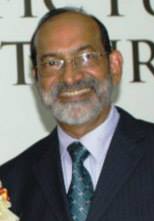
Rajesh Chandra is a Fijian academic. In February 2005 he was appointed the first Vice-Chancellor of the newly founded University of Fiji. He served as Vice-Chancellor and President of The University of the South Pacific (USP) ending his term in December 2018.
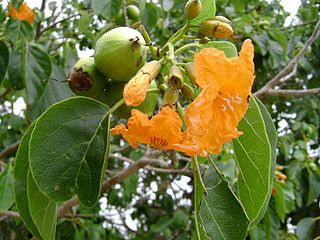
Cordia subcordata is a species of flowering tree in the borage family, Boraginaceae, that occurs in eastern Africa, South Asia, Southeast Asia, northern Australia and the Pacific Islands. The plant is known by a variety of names including beach cordia, sea trumpet, and kerosene wood, among others.
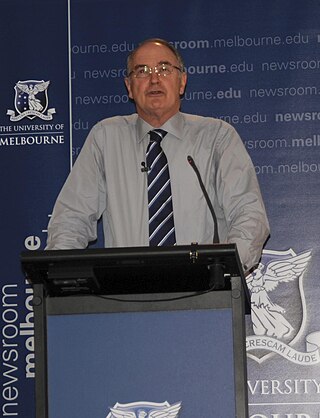
Ross Gregory Garnaut is an Australian economist, currently serving as a vice-chancellor's fellow and professorial fellow of economics at the University of Melbourne. He is the author of numerous publications in scholarly journals on international economics, public finance and economic development, particularly in relation to East Asia and the Southwest Pacific.
Global mangrove distributions have fluctuated throughout human and geological history. The area covered by mangroves is influenced by a complex interaction between land position, rainfall hydrology, sea level, sedimentation, subsidence, storms and pest-predator relationships). In the last 50 years, human activities have strongly affected mangrove distributions, resulting in declines or expansions of worldwide mangrove area. Mangroves provide several important ‘free services’ including coastal stabilization, juvenile fish habitats, and the filtration of sediment and nutrients). Mangrove loss has important implications for coastal ecological systems and human communities dependent on healthy mangrove ecosystems. This article presents an overview of global mangrove forest biome trends in mangrove ecoregions distribution, as well as the cause of such changes.
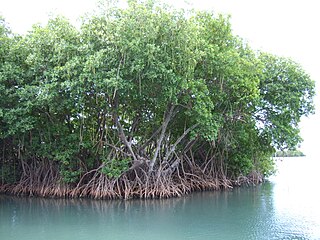
Mangrove ecosystems represent natural capital capable of producing a wide range of goods and services for coastal environments and communities and society as a whole. Some of these outputs, such as timber, are freely exchanged in formal markets. Value is determined in these markets through exchange and quantified in terms of price. Mangroves are important for aquatic life and home for many species of fish.

Ariel E. Lugo is a scientist, ecologist and Director of the International Institute of Tropical Forestry (IITF) within the USDA United States Forest Service, based in Puerto Rico. He is a founding member of the Society for Ecological Restoration and Member-at-Large of the Board of the Ecological Society of America.

Roshika Deo is a Fijian feminist and activist. She is the founder of the Be The Change Campaign/Movement in Fiji, which is a movement endorsing feminism, LGBTQI, disability rights, human rights, and environmentalism. The mission of her organisation is to transform Fiji's social, political, economic, and cultural landscape.

Dr. Mahendra Reddy is a Fijian politician and Member of the Parliament of Fiji. He served as the Minister for Agriculture, Waterways and Environment from 2017 to 2022.
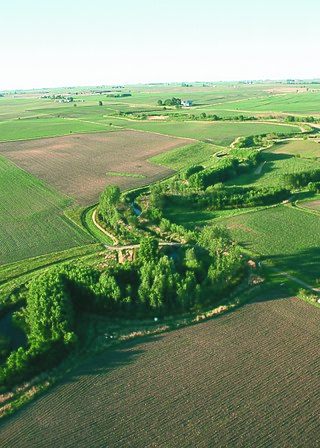
The term Nature-based solutions (NBS) refers to the sustainable management and use of natural features and processes to tackle socio-environmental challenges. These challenges include issues such as climate change, water security, water pollution, food security, human health, biodiversity loss, and disaster risk management. The European Commission's definition of NBS states that these solutions are "inspired and supported by nature, which are cost-effective, simultaneously provide environmental, social and economic benefits and help build resilience. Such solutions bring more, and more diverse, nature and natural features and processes into cities, landscapes, and seascapes, through locally adapted, resource-efficient and systemic interventions". In 2020, the EC definition was updated to further emphasise that “Nature-based solutions must benefit biodiversity and support the delivery of a range of ecosystem services.” Through the use of NBS healthy, resilient, and diverse ecosystems can provide solutions for the benefit of both societies and overall biodiversity.
Katherine Carter Ewel is a Professor Emeritus at the University of Florida's School of Forest Resources and Conservation. She is an ecosystem, forest, and wetlands ecologist who has worked in Florida for much of her career, focusing much of it on cypress swamps, pine plantations, and mangrove forests in the Pacific. Ewel served as the vice-president of the Society of Wetland Scientists in 2003, becoming president in 2004 and now since 2005, a past president. She has now retired and lives near Gainesville, Florida.
Pole Atanraoi-Reim, Kiribati’s first female lawyer, was born to Atanraoi and Clare Baiteke. Her father Atanraoi, a retired diplomat, ecologist, and historian, served as Kiribati's first Secretary of Foreign Affairs

Climate change in Fiji is an exceptionally pressing issue for the country - as an island nation, Fiji is particularly vulnerable to rising sea levels, coastal erosion and extreme weather. These changes, along with temperature rise, will displace Fijian communities and will prove disruptive to the national economy - tourism, agriculture and fisheries, the largest contributors to the nation's GDP, will be severely impacted by climate change causing increases in poverty and food insecurity. As a party to both the Kyoto Protocol and the Paris Climate Agreement, Fiji hopes to achieve net-zero emissions by 2050 which, along with national policies, will help to mitigate the impacts of climate change.

Nikenike Vurobaravu is a Vanuatuan diplomat and politician who has served as President of Vanuatu since 23 July 2022. Previously having been employed in numerous diplomatic and government positions, including as the first resident High Commissioner to Fiji, he was elected as president during the eighth round of the 2022 Vanuatuan presidential election in July 2022. He is a member of the Vanua'aku Pati (VP) political party.
References
- 1 2 3 4 "Dr Padma Narsey Lal". The Pacific Community. Retrieved 2018-07-23.
- ↑ "Lal, Padma Narsey (1951-) - People and organisations". Trove. Retrieved 2018-07-23.
- ↑ "NCCARF - National Climate Change Adaptation Research Facility". www.nccarf.edu.au. Retrieved 2018-07-23.
- ↑ USP, Communications Team. "Dr Padma Lal: USP's first Gold Medalists shares Her story. : USP News". www.usp.com.fj. Retrieved 2018-07-23.
- ↑ Lal, Padma Narsey (1990). Conservation or conversion of mangroves in Fiji : an ecological economic analysis. Honolulu, Hawaii : Environment and Policy Institute, East-West Center. ISBN 0866381325.
- ↑ "Ecological economic analysis of mangrove conservation : a case study from Fiji / by Padma Narsey Lal. - Version details". Trove. Retrieved 2018-07-23.
- ↑ Lal, Padma Narsey; Fiji, Sugar Commission of (2008). Ganna : portrait of the Fiji sugar industry. Lautoka : Sugar Commission of Fiji. ISBN 9789829803511.